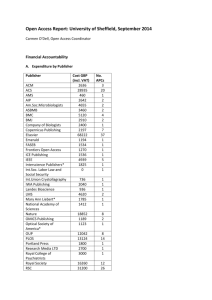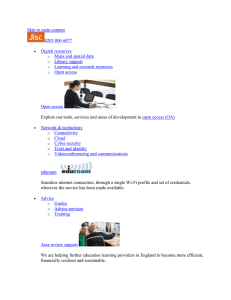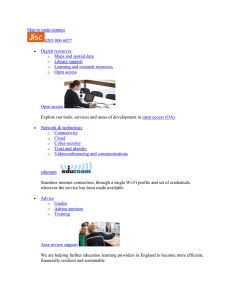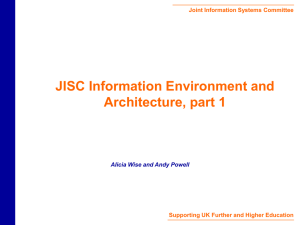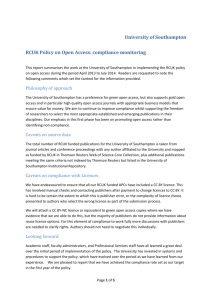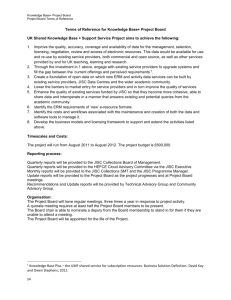JISC - Research Councils UK
advertisement
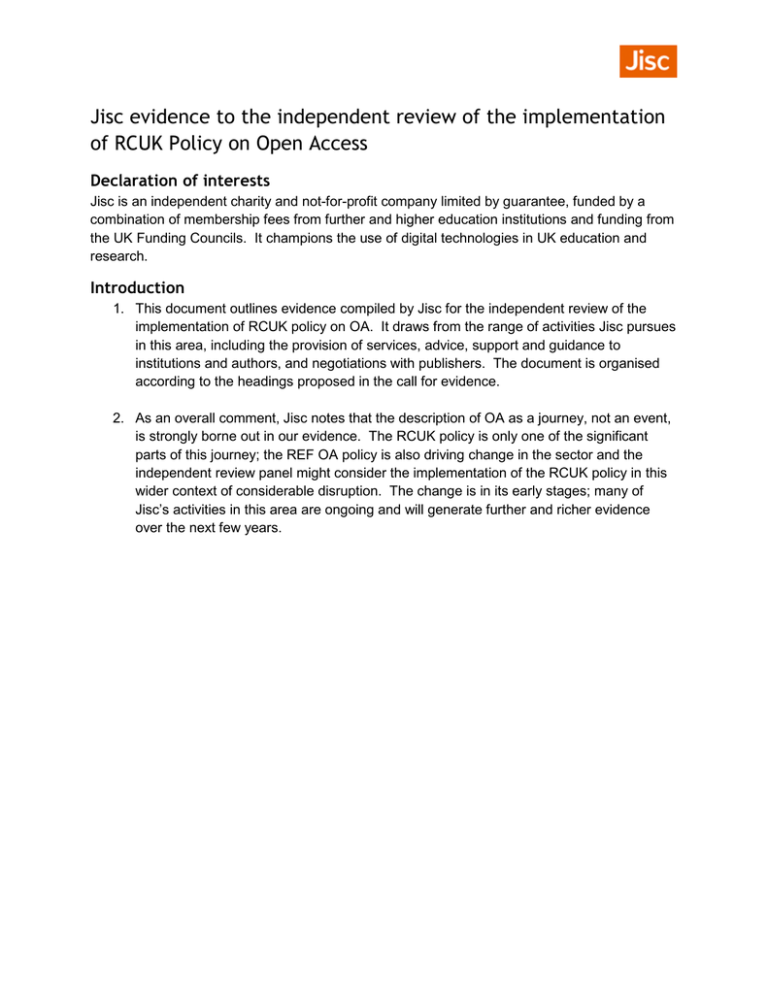
Jisc evidence to the independent review of the implementation of RCUK Policy on Open Access Declaration of interests Jisc is an independent charity and not-for-profit company limited by guarantee, funded by a combination of membership fees from further and higher education institutions and funding from the UK Funding Councils. It champions the use of digital technologies in UK education and research. Introduction 1. This document outlines evidence compiled by Jisc for the independent review of the implementation of RCUK policy on OA. It draws from the range of activities Jisc pursues in this area, including the provision of services, advice, support and guidance to institutions and authors, and negotiations with publishers. The document is organised according to the headings proposed in the call for evidence. 2. As an overall comment, Jisc notes that the description of OA as a journey, not an event, is strongly borne out in our evidence. The RCUK policy is only one of the significant parts of this journey; the REF OA policy is also driving change in the sector and the independent review panel might consider the implementation of the RCUK policy in this wider context of considerable disruption. The change is in its early stages; many of Jisc’s activities in this area are ongoing and will generate further and richer evidence over the next few years. The effectiveness and impact of the RCUK policy on the transition of RCUK funded outputs to open access. In particular: Higher Education Institutions and Independent Research Organisations 3. Higher Education Institutions now need to manage APC payments on a large scale, which is a new role that has raised numerous complications. The policy has also increased the importance of existing administrative processes, such as attribution of funder in research outputs. The considerable implications of these aspects of the RCUK policy are outlined in detail in para 19ff below. 4. In general, in its engagement with HEIs, Jisc has encountered support for the direction given by RCUK to help HEIs’ responses to Open Access (OA) internally; it gives them more certainty and clarity about their internal policy adoption. They also welcome the commitment the RCUK policy makes to OA. 5. Some institutions have noted that a calculation of the block grant for OA based on retrospective data challenges those with expanding research portfolios, and reduces the usefulness of that grant in implementing the RC policy. 6. HEIs have reported informally to Jisc that the current policy emphasis on OA, from both RCUK and HEFCE, has meant that the development of organisational and technical support for research data management within HEIs has not recently been given the priority it might otherwise have had. Different disciplines 7. In Jisc’s view, not enough is still known about why and how OA is or is not taken up in different disciplines. In the area of research data, the Digital Curation Centre has, since drafting the SCARP case studies several years ago, reflected in its advice and guidance the wide diversity of practice across disciplines. Such information would be very useful in the area of OA, given differences in funding, publishing, infrastructure, behaviour and culture. Learned societies 8. No evidence to contribute, beyond that noted below with respect to learned societies as publishers. Academic publishers 9. In this section, we highlight evidence from Jisc’s experiences in negotiating with publishers on the “total cost of ownership”, that is, the costs to institutions of maintaining journal subscriptions while paying APCs during a transition period. Data on prices themselves are given in a later section. 10. Jisc Collections has been working on the challenges surrounding the total cost of ownership (TCO) of scholarly communications arising from subscriptions and article processing charges since last year. 11. The work has involved research into the implications for institutions of compliance with funder policies, surveys and workshops with institutions to understand their wishes, discussions with a number of sector organisations (ARMA, BIS, BUFDG, GuildHE, RLUK, Russell Group, SCONUL and UUK), to agree a mandate for Jisc Collections to negotiate on behalf of the sector in this area, and meetings with publishers to explore the issues and develop arrangements that allow institutions to manage the costs arising from the combined cost of APCs and subscriptions in hybrid journals. 12. At the start of February David Willetts wrote an open letter to Dame Janet Finch following her Progress Report on the implementation of the Finch Recommendations. That letter stated that the Government "looks to the publishing industry to develop innovative and sustainable solutions", which should involve a "meaningful proportion of an institution's total [article processing charges] with a publisher" being "offset against total subscription payments with that publisher". 13. It went on to state that the "Government welcomes efforts by Jisc Collections to develop sustainable funding models that establish a relationship between the payment of APCs (and the costs of administering them) and subscription fees for an institution." This intervention provided a useful means for Jisc Collections to intensify its efforts with publishers to manage the TCO and achieve meaningful results in the short term. 14. Below are updates on the meetings that have been held with publishers: Nature of Engagement on TCO and Offsetting Arrangements Offsetting agreement in place Publisher Notes Institute of Physics Publishing Royal Society of Chemistry Sage Publications IoPP proposal offers discounts up to 90% Jisc Collections is working with the RSC to extend the Gold for Gold scheme to offer further discounts for UK institutions Sage Publications offers UK institutions a 90% discount on APCs Nature of Engagement on TCO and Offsetting Arrangements Offsetting proposal under negotiation Publisher Notes Elsevier Springer Taylor & Francis Wiley Offsetting as a principle under discussion American Chemical Society Cambridge University Press No current discussions American Institute of Physics British Medical Journal Oxford University Press Nature Publications Group Jisc Collections is expecting an offset proposal st from Elsevier by the 1 week of October Springer presented an offset proposal on the th 11 September. Jisc Collections is in advanced discussions with T&F and Wiley over substantial offsetting proposals ACS is putting in place a voucher scheme, however this is aimed at authors rather than institutions, which limits its utility in the UK. Discussions are ongoing about a scheme that reflects UK requirements more effectively. Jisc Collections is in the early stages of discussions with CUP about an offset scheme for 2015. AIP has a limited voucher scheme in place for the UK, however, following positive discussions in the spring, there has been no further response to Jisc Collections on this issue. BMJ has yet to indicate how it wishes to handle this issue. OUP has indicated that it will put in place a prepayment scheme during 2015. Calls for further action have not received a response. NPG has indicated that will not be in a position to implement an offsetting scheme in 2015. 15. On the whole the publishing community has shown a willingness to work proactively with Jisc Collections to put in place arrangements that limit the overall increase in payments by an institution. As noted at the start of the document OA is a journey rather than an event and the discussions with publishers reflect this. Many of the schemes under discussion are pilots and there is a mutual intention to review the schemes in the light of evidence gathered during their implementation. 16. It should be noted that sometimes these offers from publishers carry conditions, such as a requirement that HEIs are part of the relevant “big deal” arrangement, that they open a pre-payment account with its own conditions, or limitations in what any offset refund can be used for. As the table shows, some very significant publishers have not yet engaged fully in these discussions, and some have not demonstrated that they understand that this is a priority for their customers. Collaborations between researchers both within the UK and internationally 17. No evidence to present on this topic. Internal processes within Higher Education Institutions and Independent Research Organisations and the practicalities of administering the RCUK Block Grant to support Open Access Any difficulties in the processes and workflows relating to APC payments to publishers 18. The Jisc APC project ran during 2013-14, and was a pilot project that aimed to assist UK higher education institutions and publishers worldwide in managing Gold OA article processing charges. Managed by Jisc Collections, the pilot engaged representatives from academic institutions, publishers, funders and intermediaries to explore key issues and respond to a changing global Open Access landscape. There were two complementary strands of activity: an exploration of key issues and challenges within a Gold OA environment; and delivery of an online administration platform for pilot institutions. The following evidence draws from the findings of this project, which will be further documented in a report to be released shortly. 19. Jisc APC uncovered problems with the current system of APC payments (see the case studies of participating HEIs). These include making sure payments are made on time, which can be a problem with either the university or the publisher because neither are used to working with payments on this scale. For institutions and publishers, keeping track of payments and reconciling these between various systems can undoubtedly present challenges where systems are developing or have yet to be established. Many publishers are working with legacy, and often multiple, systems resulting in inefficiencies and in some cases an inability to supply data in appropriate formats quickly and easily. While the Jisc APC pilot intermediary service aimed to offer a more efficient workflow, instances where a publisher couldn’t reconcile a payment resulted in the researcher being chased for payment and delays to making items openly accessible. 20. The transition from purely subscriptions to a mixture of subscriptions and APCs has resulted in challenges for institutional finance departments where the impetus to make an article OA as quickly as possible is often at odds with institutional finance processes. Demand for APC management systems was more acute in such cases as potentially they were seen as a way of addressing such a barrier. 21. The OA landscape is in transition and institutions are at early stages in terms of defining processes, establishing new workflows and relationships. The management of APCs demands integration between the research office, library, repository and finance functions and this involves new ways and patterns of working that take time to develop. Managing communications with researchers around emerging policies is critical for success but again this takes time to establish and maintain (see also para 42, below). 22. APCs and membership schemes: Feedback indicates a lack of transparency within the APC market. This applies across a range of publishers and also for a single publisher where different license options command different APCs. This complex picture makes comparisons and an evaluation of pricing and costs difficult. Many institutions have chosen to establish membership schemes as an efficient and cost-effective way of managing APCs but this inevitably limits choice. 23. Staffing: APC administrative costs are likely to be higher at present whilst institutions work to establish efficient processes. Currently this work is often being managed by those working at a fairly senior level within the organisation although it’s assumed that much of this work will become more routine over time. For many institutions, there is difficulty in determining what the administration costs are at present. Apart from managing and administering APCs, liaising with publishers regarding licences, payment dates, publication dates, errors and omissions, institutions also spend time researching publishers’ OA polices, payment methods, and policies for funder compliance, eg using Sherpa/FACT. 24. In many cases staff have been diverted from previous activities to manage APCs. Even within larger institutions, the quantity of APCs is in many cases still relatively small but there is concern that institutions may not have enough resource in place adequately to meet the demand to process APCs, as demand and the quantity of APCs increases. It’s clear that while some want to work with an intermediary, other institutions and publishers don’t see the value of using an intermediary service at this stage (see an earlier report from the Open Access Implementation Group on this topic). Institutions want to fully understand the processes and the issues around management of APCs and they perceive an intermediary as presenting a barrier to that understanding at this stage in the process. Also while the quantity of APCs is still quite small they are content to manage these with a series of spreadsheets. There is certainly some interest in procuring the services of an intermediary as demand increases in the future and this demand and requirements will be monitored by Jisc. 25. Compliance: Ensuring compliance and reporting to funders is a key priority but Institutions have reported being unclear about funder requirements. Many institutions have been recording fairly detailed information in preparation for this. 26. Jisc Monitor: In reflecting on some of the institutional challenges identified via Jisc APC It was clear that institutions would like support from Jisc in meeting HEFCE policy requirements, monitoring publication output and reporting on compliance with Open Access policies. Jisc Monitor is responding to this currently through a one year pilot that started in May 2014. It is informed by and builds on the work of Jisc APC. Monitor has adopted a user-centred approach to explore the development of services to help universities in several use case areas: (1) tracking publication activity, (2) monitoring compliance with funder OA policies and (3) associated expenditure on publication charges, supported by (4) exploration of the standards and protocols enabling identification and data exchange. Any difficulties in obtaining the data required to demonstrate compliance 27. During March and April 2014, Information Power Ltd (IPL) were contracted to undertake a data collection exercise in order to obtain article processing charge (APC) data for Jisc Collections. This, along with evidence from the Jisc APC and Jisc Monitor projects, has uncovered some difficulties in collecting information about APC payments. The following is an excerpt from the IPL report: ‘Information Power Ltd (IPL) were contracted to undertake a data collection exercise during March and April 2014 in order to obtain real data for Jisc Collections to input into their modelling tool for publisher negotiations for Total Cost of Ownership (TCoO). During the data collection exercise a number of issues arose regarding the data collection and the processes. One of the most significant issues was the fact that not one of the 24 universities involved in the project were able to tell the total number of APCs paid by their institution. In the vast majority of cases, the Library handled the RCUK and Wellcome funds and captured data on APCs paid from those funds. But none were able to establish how many APCs were paid from departmental/ faculty research project funds. A number of librarians asked the University Finance department for this information, but none were able to provide a figure. The data collected by most libraries would not be adequate for any auditor, as there was no clear trail to final publication or evidence of the publisher meeting funder requirements. There was a lot of confusion by both publishers and libraries over the difference between the various business models and licensing models. Frequently it was unclear whether the APC payment was made for an article to be totally open, embargoed, available for deposit in a repository, etc. There were also many references to the publisher not meeting OA copyright requirements, with refunds or offers of errata slips being made by the publisher. What follows is a list of the issues which arose with the data received: 1. Some APC records turned out to be for books, book chapters, and conference proceedings. There should probably be a separate category for these, as they will be on the increase and included in future funding. 2. There was frequently no indication of the journal to which the article had been submitted. 3. Where there was article level data (title or author) some of the gaps were able to be filled by IPL. However, this was very time consuming. 4. The funder was frequently not shown in the data. For the purposes of the project, where the funder was not specified the assumption was made that it was RCUK. 5. Some APC spreadsheets indicated whether the title was Green or Gold but this was often incorrect. 6. Publication date was not always given - just the DOI/PubMed ID. IPL had to use the article title and authors to get a publication date. Where the date was given, it was not clear if this was for first publication (usually electronic) or print. Normally when we looked up publication date we used the electronic. Note: This will only be a problem if the difference between calendar and financial years is an issue. 7. There were comments in the APC data saying “no time to check if article had been published”. Since they often had the DOI or PubMed link this should have been easy to do. When there was no DOI but there was an article title, it was straightforward to use Google to get the DOI and /or PubMed links and publication date off the publishers’ website. This provided an opportunity to see how the publisher was presenting the OA article and the relevant licence terms. They were often not at all clear. 28. Particular issues included: 29. Licenses: The unambiguous requirement for CC-BY for Gold OA articles has introduced clarity into this area. However, for Green OA, manually looking up licensing information for each publication is very time-consuming so the only way to efficiently check for compliance with licensing terms is to automate the process. However this is difficult to do at the moment because licensing information on publisher websites is often unclear, so automated tools such as the Open Article Gauge find it difficult to check which license is attached to an article (Neylon 2014). NISO (National Information Standards Organisation based in the US) will shortly release recommended practice agreed with publishers whereby each article should carry a “licence_ref” metadata field pointing to the appropriate dated licence. CrossRef is already implementing this, and some – but not all – publishers are adding this metadata to their CrossRef record. This will, in time, help. However, the proliferation of licences, most recently by the release of yet more bespoke licences by the STM publishers’ association 1, means that this area remains complex and unclear. 30. Funder attribution: Despite the availability for some years of the RIN Guidelines for funder attribution and, more recently, FundRef, the acknowledgement of funding in published papers remains at best patchy. Some institutions have recommended that such acknowledgement becomes mandatory, where relevant, in the submission of manuscripts to journals, and this might be beneficial if such information were then openly available in a timely way from publishers. Another approach, supported by many institutional research management systems and increasingly practiced by universities, is for the link between grant and published output to be made by the author within institutional systems. This would be encouraged by developments in the Research 1 Note the strong negative reaction to the launch of the STM licences. Councils’ outcomes collection service (ResearchFish) to accept submission from institutional systems. 31. Management information and reporting requirements: While the compliance measures requested of institutions by RCUK were simple and clear, there has been uncertainty about the relationship between those and data on individual research outputs that needs to be submitted to the Research Councils collection service, ResearchFish. Jisc has worked with RCUK and HEFCE to develop the RIOXX metadata profile, which addresses some, but not all, of the perceived requirements faced by institutions from various funders. Ongoing Jisc projects, such as that at Glasgow, are continuing to develop a clearer picture on this question. Management information and perceived reporting requirements are encouraging institutions to use more sophisticated and usually commercial research information management systems, which are increasingly part of larger product suites offered by, eg, Elsevier or Thomson Reuters. The wider Open Access landscape in the UK and internationally 32. The implementation of RCUK’s open access policy has been successful in raising the visibility of gold open access publishing globally and resulted in an increased uptake of gold open access in the UK (see Fig. 2 below). By accepting the recommendations of the Finch report, RCUK has supported APCs for hybrid journals with subscription publishers, which has led to high levels of expenditure with those publishers (see the spreadsheet Jisc Collections aggregated APC data by publisher). UK authors are now publishing more work in hybrid journals than in fully open access journals with no APCs, a situation that is reversed in the rest of the world (Elsevier 2013, p.55). The recent report released by the Wellcome Trust, in partnership with RCUK, Jisc and others, on the hybrid journal market provides a wealth of data on this topic, and makes policy suggestions that RCUK should consider carefully. 33. Although not the intention, the RCUK policy may have promoted hybrid publishing with subscription publishers at the expense of alternative (potentially cheaper and more effective) models e.g. the Library Partnership Subsidies scheme being investigated by Open Library of Humanities. Jisc Collections continues to investigate such models and has agreements in place with a number of pure OA publishers (for example, PeerJ). However, as university funds are increasingly tied up in paying APC payments, as well as subscription costs 2, institutions have less money to invest in research infrastructure and alternative publication models. If RCUK has an interest not only in OA, but in a diverse market in publishing services, then this could be reflected in its policy and associated guidance to institutions. 2 Jisc’s work to restrict the “total cost of ownership” in negotiations with publishers is described elsewhere in this response. The cost of Open Access publishing 34. The IPL data noted above were collected before any offsetting schemes were put in place; Jisc Collections will be monitoring costs to see the impact of its negotiations in this area. 35. IPL data suggests that the price of APCs charged by hybrid publishers has been converging on the average price used in the Finch report (Lawson 2014, see Fig. 1), which was high compared with other estimates, perhaps because it focused on the price of ‘high impact’ STM journals and did not take into account the far lower (or non-existent) APCs of the majority of full open access journals and humanities journals (see Lawson 2014a for further analysis of this issue). Combined with the tendency for RCUK authors to publish in hybrid journals (75-80% - see Fig. 2, only one full open access publisher, PLOS, is represented), this may be raising the cost of open access publishing. Hybrid journals on average charge significantly higher APCs than full open access journals (Björk and Solomon 2014, p.4). Fig. 1 (Source: Jisc Collections/IPL) Fig. 2 (Source: Jisc Collections/IPL) Data on APC payments made, if possible by journal, so as to help understand disciplinary differences in APCs 36. The data collected so far by IPL shows that the majority of RCUK-funded APCs were for hybrid journals with otherwise subscription publishers, rather than full open access journals/publishers (Lawson 2014). Some of this data has been publicly released on figshare and Jisc Collections is pursuing this further by working with libraries and research funders to regularly release data in a standard format. 37. List of publicly available APC data for the UK: The Wellcome Trust 2010-11, 2011-12 and 2012-13, University of Cambridge (RCUK 2013-14), Queens University Belfast (RCUK 2013-14), Imperial College University (2006-14), University of Warwick (201314), University of Sussex (2013-14), University of Liverpool (2013-14), University of Manchester (RCUK 2013-14), University of Sheffield (2013-14), University of Glasgow (2013-14), aggregated Jisc Collections data Compliance with the ‘green’ Open Access embargo periods mandated by the policy. 38. Unfortunately the Jisc Sherpa/RoMEO service has not been set up easily to capture and report changes in journal OA policies, including embargoes, over time. However, should the independent panel see value in it, then dedicated resource might enable Sherpa to research changes in embargo periods in the period before / since the RC policy was introduced. When publishers change their policies on this it leads to difficulties for both authors and librarians in knowing whether or not they can archive research. Some publishers also extended their embargo periods considerably, for example Emerald lengthened theirs from 0 to 24 months (Poynder 2013). Some institutions have told Jisc that they have observed that some learned societies have set embargoes which are longer than the RCUK mandated period for Arts and Humanities. This response to RCUK’s policy affects authors worldwide, not just those funded by the Research Councils. 39. Institutions have taken great care to observe publishers’ embargo policies. The Sherpa/FACT service, offering compliance information for journals, records around 2000 journals are checked every month, which indicates a high degree of diligence on the part of institutions. 40. Jisc notes that the REF OA policy is a significantly stronger driver for many institutions in managing green OA than the RCUK policy, though it is still too early to assess the interactions between the two policies in terms of practice on the ground. The impact on particular discipline areas of the RCUK requirement for Creative Commons licensing, in particular CC-BY licences for ‘gold’ OA. 41. No direct evidence on this point. How effectively the policy has been communicated, including evidence or views to suggest any further engagement needed. 42. Some institutions have reported to Jisc that they consider the role of the institution in communicating policy to funded researchers was not fully considered by RCUK, and that further engagement is needed effectively to communicate the policy, in partnership with institutions, recognising the complex OA policy environment faced by institutions and authors.

